By OcJim
“Equal justice under the law” is a cornerstone of the American democracy. Statues of Lady Justice are blindfolded to symbolize that justice is blind to the differences between the powerful and the weak, the rich and the poor. Fairness and equal treatment of citizens is the life-blood of democracy. Nevertheless, Americans know that money or lack of it buys a different justice system for the rich and the poor.
There is a bitter irony to the Supreme Court ruling that corporations should be treated as individuals and to Mitt Romney’s plaint, “Corporations are people, my friend.” If the irony needs to be pointed out, it is the fact that no individuals in Wall Street corporations or the corporations themselves were prosecuted for their crimes when they cheated investors, consumers and homebuyers out of billions of dollars.
It is a fact that the rich and powerful are generally immune to even the prosecutorial stage of justice, too often evading any threat of prosecution when in a powerful position or backed up by a powerful force. Since the start of the financial crisis, Wall Street criminal activity has resulted in no arrests or prosecutions. Paradoxically, the only arrests on Wall Street regarding activities related to the financial crisis are 2,511 people arrested for disturbing the peace and related activities, constituting Occupiers protesting the Wall Street crime wave.
In sort of a Catch-22 situation, Wall Street criminals, in effect, tanked funds for local and state prosecution systems throughout the country, especially in New York. The result is that prosecutors claim that complex financial crimes “are hard cases to make,” and as a result civil settlements, where powerful corporations pay small (for limitless corporate coffers) financial penalties, have come to rule the day.
Earlier this year oligopolistic banks, including Bank of America, JP Morgan Chase, Wells Fargo, Citigroup and Ally Financial, agreed to pay out $25 billion to resolve criminal violations of state and federal law. Twenty billion dollars of the money was dedicated to various forms of financial relief to victimized / stricken / underwater borrowers and five billion to the federal and state governments. Reputedly, some governors, like Scott Walker of Wisconsin, are considering their state cuts as free money. Supposedly $1.5 billion of the $5 billion will go as cash to borrowers whose homes were sold or taken in foreclosure between Jan. 1, 2008 and Dec. 31, 2011, that is, if they meet other criteria.
Justifiably cynical, homeowners will no doubt have to fight long and hard to get a few dollars out of any of this money in a system stacked against them. Other settlements like this seem to be common. Rather than criminal prosecutions, companies, when pressed, would rather pay off the government than admit guilt in a court of law. For this money, for example, practitioners of robo-signing ownership documents with fake owner names like “Bogus Assignee [no joke]” will not be prosecuted, as well as the banks behind them.
Already having the worst safety record among oil companies, monolithic British Petroleum (BP) agreed to pay $20 billion in damage claims and small punitive fines in exchange for greatly-reduced litigation costs and dropped investigation of high officials — though not necessarily written into the terms — who helped promulgate the recklessness leading to the disaster which killed 11 people and tens of thousands of mostly aquatic wildlife. Their last 2 disasters before Deepwater Horizon killed 30 and seriously injured 200. If this corporation is a person, the person certainly has a lot of blood and destruction on its hands.
Then there is Citibank. It paid a pittance of $285 million for an SEC civil settlement. The firm had sold securities to investors which they later bet would decline in value, an obvious case of criminal fraud – if evidence had been presented. Citibank willingly paid this fine, rather than openly admit criminal activity and poison an already muddy ethical pool.
Such criminal proof is lost in civil settlements. Financial institutions can assert that the decision by the government to limit enforcement to civil action is proof that no laws were broken. The arrogance among leaders of financial institutions demonstrates their belief they are above the law and gives them a sense of entitlement, even a false sense of superiority.
For the poor and the powerless, it is an entirely different scenario. Their experience with the criminal justice system is one of a victim in dealing with a system seemingly bent on pushing them into prison. It doesn’t seem to matter whether they are guilty or innocent.
Take the story told by Stephen Bright who recently gave a Commencement Address at Yale Law School, spotlighting unequal justice, urging graduates to serve the needs of the poor.
Shanna Shackelford, an African American woman, in west Georgia, was such a victim. For the last three years, Shanna has been charged with arson. The place she was renting was destroyed by fire and she lost everything that she had. She was homeless for some time after the fire, but she got two jobs – at Walmart and as a nurse’s assistant – and landed a new place to live. She was able for awhile to continue her studies at a community college where she was majoring in criminal justice.
A few days before her trial, Shanna was assigned a public defender suffering from a drug addiction. “Anyone who sees him can tell he is an addict at first glance,” she said. He was incompetent, and she did much of her own investigation. Three months after complaining, she got another lawyer, who constantly encouraged Shanna to take a 15-years-in-prison offer by the prosecution. Declaring innocence, Shanna declined.
A friend provided $3500 of a $5,000 fee so she could get her own attorney. This attorney missed court dates for weeks at a time. Even though fined by the court, he didn’t appear. Missing work to appear for several trial dates her attorney didn’t bother to attend, Shanna lost both of her jobs.
Again and again the trial had been delayed because of her attorney’s absence. Shanna couldn’t find work because of the arson charge hanging over her and had no home and no prospects. The last court offer was 10 years on probation and restitution of half a million. She told her attorney absolutely not.
During this period of time, Shanna has had 20 continuances, lost her jobs, lost her home and lost her dogs, and is now sleeping in her car. Her car is about to be taken for lack of payment and she will be on the streets again.
There are thousands of people like Shanna Shackelford who is slammed by the so-called justice system, die a slow death of deprivation while the system’s concept of justice is production-line jurisprudence, pleading out the poor, bargaining to avoid the embarrassment of a pretense of a fair trial, while overworked public defenders and large-fee-seeking lawyers would rather circumvent pesky trials for plea bargains.
The system sees defending poverty-stricken clients as wasting court time and tying up overworked public defenders with little chance of spending enough resources to win cases. Plea bargains are with the devil who has all the playing cards.
For the 2.2 million behind bars in the United States, disproportionately minorities and poor, “Equal justice under the law” is no longer the mantra of our American democracy. It is more of an acidic joke, a travesty of justice, pitted against the poor, especially for those profiled and stopped, occasionally beaten, and arrested in poor communities, usually by overworked criminal justice officials across our country.
Defendants who are poor most likely become chattels of the state. Those with monetary resources don’t get charged, or if they do, money speaks against conviction or plea bargains.
Lady Justice is blind, but she is blind to the needs of the poor.
—————————————————————————-
Tell me here —-> Common Good
Equal Justice for Some,
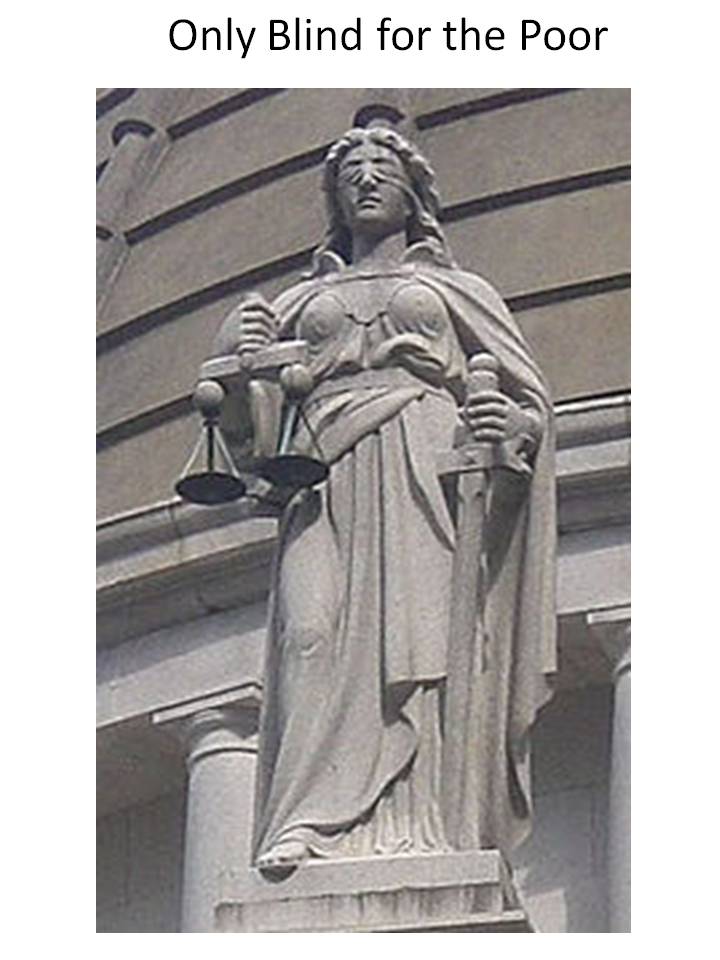
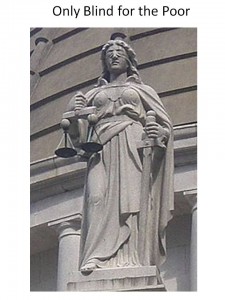
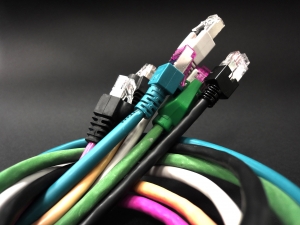
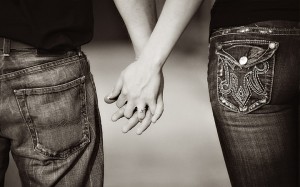
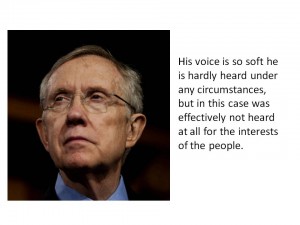
Pingback: Civil Rights Self Defense | Public Intelligence Agency
Pingback: Re-Assembling U.S. History: | The Public Intelligence Agency; All Rights Assumed